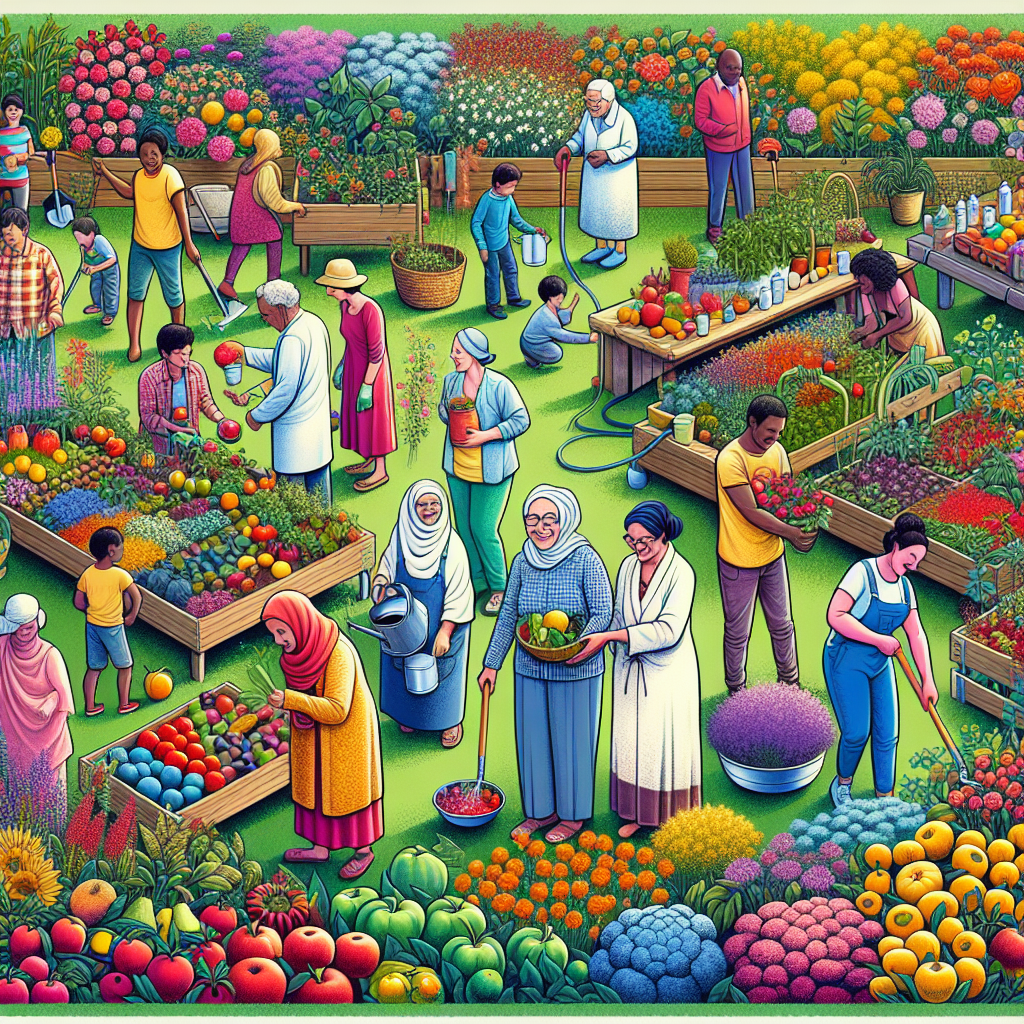Exploring the Health and Social Benefits of Community Gardens

Community gardens do more than just provide a space to grow plants. They offer a variety of benefits that improve health, strengthen communities, and support the environment. These gardens can help people eat more fruits and vegetables, reduce stress, and create bonds among neighbors. They also teach valuable skills and promote sustainable practices. This article explores the many ways community gardens make a positive impact.
Key Takeaways
- Community gardens encourage healthier eating by increasing access to fresh fruits and vegetables.
- They help build strong social connections and foster a sense of community among participants.
- Gardening activities promote physical exercise and can improve mental health by reducing stress.
- These gardens support environmental sustainability through practices like composting and water conservation.
- Community gardens offer educational opportunities, teaching people about gardening, nutrition, and the environment.
Health and Nutritional Benefits of Community Gardens
Boosting Fruit and Vegetable Intake
Community gardens are fantastic for increasing the amount of fruits and vegetables people eat. Gardeners often consume more fresh produce than those who don't garden. This is especially true for kids, who can see a significant boost in their daily vegetable intake. Growing your own food makes it easier to include healthy options in your diet.
Enhancing Food Security
In areas where fresh food is hard to find, community gardens can be a game-changer. They provide a local source of nutritious produce, helping to improve food security. This is crucial in food deserts, where grocery stores with fresh options are scarce. By growing their own food, families can save money on groceries and even earn a little extra income.
Promoting Physical Activity and Mental Well-being
Gardening is not just about plants; it's also great exercise. Activities like planting, weeding, and harvesting can improve strength, flexibility, and endurance. Plus, spending time in nature has been shown to reduce stress and anxiety. The satisfaction of growing your own food can also boost your mood and overall mental health.
Community gardens offer a unique blend of physical activity, mental relaxation, and nutritional benefits, making them a valuable asset to any neighborhood.
Strengthening Community Bonds Through Gardening
Fostering Social Connections
Community gardens are fantastic places for bringing people together. They create a sense of belonging and help neighbors get to know each other. Gardening together allows people to share tips, stories, and even recipes. This social interaction builds strong community ties and makes neighborhoods feel more connected.
Creating Cultural Crossroads
These gardens are often melting pots of different cultures. People from various backgrounds come together, united by their love for gardening. They share gardening tips, recipes, and stories, creating a vibrant hub of cultural exchange. This helps break down cultural barriers and fosters understanding and respect among community members.
Serving as Experiential Outdoor Classrooms
Community gardens are also great for learning. They offer hands-on experiences in gardening, nutrition, and even science. Kids and adults alike can learn about healthy eating habits and the environment. Many gardens host workshops and events to educate the community, making them valuable educational resources.
Environmental and Economic Impacts of Community Gardens
Enhancing Urban Biodiversity
Community gardens are fantastic for boosting urban biodiversity. They create green spaces that attract pollinators like bees and butterflies, which are essential for plant reproduction. These gardens also provide habitats for birds and beneficial insects, making cities more vibrant and ecologically balanced.
Promoting Sustainable Practices
Community gardens often use organic methods, which help reduce the use of harmful chemicals. They also promote sustainable practices like composting and water conservation. By growing food locally, these gardens help reduce the carbon footprint associated with transporting produce from far away.
Boosting Local Economies
The economic impacts of community gardens go even further, with noted improvements on neighboring property values. By increasing property values and adding green spaces, these gardens make neighborhoods more attractive places to live. They also offer opportunities for people to learn new skills, like gardening and small-scale farming, which can lead to job creation and local business growth.
Community gardens are more than just plots of land; they are vibrant spaces that offer a multitude of benefits. From boosting health and nutrition to fostering community bonds and promoting sustainability, these gardens play a crucial role in urban and rural settings alike.
Mental Health Benefits of Community Gardening
Reducing Stress and Anxiety
Community gardening is a fantastic way to reduce stress and anxiety. The act of planting, weeding, and harvesting can be incredibly calming. Spending time in nature and engaging in these repetitive tasks helps to clear the mind and promote a sense of peace. Many people find that their worries melt away as they focus on the simple, yet rewarding, tasks of gardening.
Improving Mood and Emotional Well-being
Gardening has been shown to improve mood and emotional well-being. The satisfaction of seeing plants grow and thrive can boost self-esteem and provide a sense of accomplishment. Additionally, the physical activity involved in gardening releases endorphins, which are natural mood lifters. Connecting with nature and nurturing living things can bring immense joy and fulfillment.
Providing Therapeutic Spaces
Community gardens serve as therapeutic spaces for many individuals. These gardens offer a safe and welcoming environment where people can escape the hustle and bustle of daily life. The beauty and tranquility of a garden can provide a much-needed respite, allowing individuals to relax and recharge. For those struggling with mental health issues, gardening can be a form of therapy that promotes healing and growth.
Community gardens are transformative spaces that enhance mental health, promote physical well-being, and foster social connections. They provide fresh produce, support sustainable practices, and create inclusive environments for all ages. By engaging in gardening, individuals experience stress relief, learn new skills, and contribute to their communities, making these gardens vital for personal and communal growth.
Designing and Maintaining a Thriving Community Garden
Creating a successful community garden involves thoughtful planning and ongoing care. Here are some tips to help you design and maintain a garden that will flourish and bring joy to your community.
Planning and Layout Tips
Start by evaluating the available space and understanding the needs of your community. Sketch a layout that includes paths, plots, and communal areas. Maximizing small spaces can be achieved through vertical gardening and container planting. Ensure there's access to water and consider the sunlight each area receives.
Choosing the Right Plants
Select plants that are well-suited to your local climate and soil conditions. Opt for a mix of fruits, vegetables, and flowers to create a diverse and productive garden. Perennial plants can provide long-term benefits and reduce the need for replanting each year.
Engaging the Community
A thriving community garden relies on active participation. Organize regular workshops, garden tours, and harvest celebrations to keep members engaged. Establish a garden committee to ensure democratic management. Encourage individuals to take on leadership roles and share their skills. By fostering a welcoming atmosphere, the garden becomes a vibrant hub for the neighborhood.
These community gardening tips will help you get growing while building connections in your neighborhood.
Educational Opportunities in Community Gardens
Hands-On Learning Experiences
Community gardens are like living classrooms where people of all ages can learn by doing. Kids and adults alike can get their hands dirty and discover the joys of planting, growing, and harvesting. These gardens offer a unique way to learn about nature and food production. Whether it's understanding the life cycle of a plant or learning how to compost, there's always something new to explore.
Workshops and Community Events
Many community gardens host workshops that cover a variety of topics, from sustainable gardening practices to cooking with fresh produce. These workshops are great for both beginners and seasoned gardeners looking to expand their knowledge. Skill-sharing sessions allow community members to teach each other, fostering a sense of collaboration and mutual growth.
Teaching Environmental Stewardship
Community gardens are perfect places to teach environmental stewardship. They provide a hands-on way to learn about sustainable practices like composting, water conservation, and organic farming. By participating in these activities, people can see firsthand how their actions impact the environment. This kind of education is invaluable for fostering a sense of responsibility and care for our planet.
Community gardens offer a unique blend of hands-on learning, skill-sharing, and environmental education, making them valuable resources for any neighborhood.
Community Gardens as Hubs for Social and Cultural Exchange
Community gardens are more than just places to grow plants; they are vibrant hubs that bring people together and foster a sense of community. These gardens serve as social and cultural melting pots, where people from different backgrounds can connect, share, and learn from each other. Let's explore how community gardens act as hubs for social and cultural exchange.
Conclusion
Community gardens are more than just patches of land; they are vibrant spaces that bring people together, promote healthier lifestyles, and support the environment. These gardens offer a place for neighbors to connect, share knowledge, and grow fresh, nutritious food. They help reduce food insecurity, provide a sense of accomplishment, and create green spaces in urban areas. By participating in community gardening, you not only improve your own well-being but also contribute to a stronger, more connected community. So, grab a shovel, plant some seeds, and watch as your garden—and your community—thrives.
Frequently Asked Questions
What are community gardens?
Community gardens are shared spaces where people can grow plants like fruits, vegetables, and flowers. They are usually found in cities and are managed by a group of local gardeners.
How do community gardens improve health?
Community gardens help people eat more fruits and vegetables. They also offer a place for physical activity, which can lower stress and improve mental health.
Can community gardens help the environment?
Yes, community gardens can make the environment better by adding more green spaces. This helps reduce pollution and supports local wildlife. They also encourage eco-friendly practices like composting and saving water.
How do community gardens build community ties?
Community gardens bring people together, helping them form social connections and a sense of community. They provide a space for people to work together, share knowledge, and support each other.
Are community gardens good for the economy?
Yes, community gardens can help the local economy by providing fresh produce, which can lower grocery bills. They can also increase property values in the neighborhood and sometimes create jobs.
What educational benefits do community gardens offer?
Community gardens offer hands-on learning for all ages. They teach gardening skills, environmental care, and healthy eating habits through workshops and community events.

